When 35-year-old Potur arrived at the Nguenyyiel refugee camp in Gambella in Ethiopia he quickly realized that the food rations his family received from the World Food Programme (WFP), provided just enough food to survive – and very little else. He therefore started a small business selling tissue paper, gum, and whatever else he could get his hands on in order to generate a small income to save up for a better future for the family, and for his five children in particular.
Starting a business with virtually no capital, however, is no small feat – and Potur had difficulties stocking his little shop. And when you have nothing to sell, you cannot make money.
Potur struggled to make ends meet at home – and most of the time he was left with no funds to invest in growing the business. But he struggled on – because the alternative was worse. Then he met DCA.
Food aid now – followed by long-term assistance
With generous funding from the US State Department’s Bureau of Population, Refugees and Migration (BPRM), DCA Ethiopia works with food aid distribution in Nguenyyiel camp – but also looks beyond the immediate needs of the refugees and focuses on longer-term assistance that can foster economic self-sufficiency. Exactly what Potur needed help achieving.
As a micro-entrepreneur in a vulnerable situation Potur was eligible for training on entrepreneurship and business management – and for additional capital to get the business airborne.
New skills, new capital, new beginning
After completing the training Potur received start-capital of 10,000 Birr (€171) – and with new skills in business strategy and financial management he could draft a plan on how to best meet the actual demand of his customers, take into account how some demands change during the year, and ensure correct pricing of the products on sale.
And he quickly saw how his business transformed. “The profits started increasing – slowly but surely. Especially as I could procure more items for my shop,” he says.
Toward greater heights
Potur explains that the skills gained from the training and the injection of start capital, has given his business a boost that means that he can now provide more broadly for all of his family’s needs – and he can save money for the future. And it doesn’t end here, he says.
“I am just starting – I plan to expand the business and make an even bigger shop,” he concludes self-assured.
About the project
Potur is a beneficiary of the Food and Livelihood Improvement for South Sudanese Refugees and Host Communities in Gambella – made possible by generous funding by the US Department of State’s Bureau of Population, Refugees and Migration (BPRM).
The project focuses on enhancing food security on the one hand and economic self-sufficiency on the other. It targets vulnerable groups among refugees in Nguenyyiel and Kule camps as well as host communities of Itang and Abol districts of Gambella region.
The food aid consists of giving access to nutritious food via an electronic voucher system – an important supplement to a basic diet that often leaves children and vulnerable people malnourished.
The livelihood component aims at building the resilience of beneficiaries by capitalising on their existing resources.
A beneficiary capacity assessment that was conducted in both the camps has indicated small business and petty trade activities as major skills endowed by the refugees.
To this end, DCA supports refugee entrepreneurs and business owners by providing entrepreneurial training, equipping them with essential skills such as business plan development, financial management, pricing, and marketing. In addition, start-up grants are provided since access to loans and other financial services are limited in the area for refugees.


